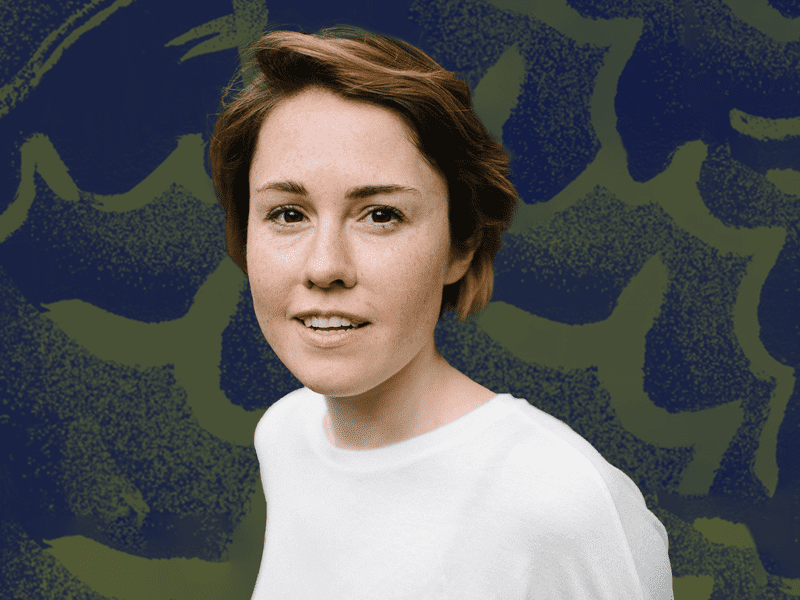[music sound effect]
TERRANCE MCKNIGHT: This is the Open Ears Project.
[MUSIC PLAYING: Felix Mendelssohn’s Octet for Strings in E-flat Major]
CAROLINE SHAW: My name is Caroline Shaw. I'm a musician in New York, a violinist, composer, and I have chosen the last movement of Mendelssohn's "Octet."
I first heard it when I was about 15. I think it was the first night of band camp, essentially. And it's kind of the summer when I fell in love with playing chamber music.
This moment right here, that's when they're first together in unison after all that crazy conversation right before, and it's about to split.
The cellos are saying something but the violins are saying something else, and they're gonna come together… right there.
So it's so exciting just like to listen to, and then to see people perform together, and you know, it has this sense of like… you feel like you can do anything.
One of the things I love about it is that it sounds like a crazy conversation, barbecue, dinner party – where the second cello comes in, it's like someone just talking really fast and everyone's talking really fast and then suddenly it congeals all together in this totally joyous melody that I love.
And there are also parts where the players trade off single notes back and forth, and it feels like this really fun metaphor for democracy and how to communicate with each other.
Chamber music at its core is a group of people, usually less than 10, playing music together and relying on each other to stay together and to bring life to the music that's on the page. And kind of originally chamber music was something that you did in the chamber, in your home. I think it is a wonderful way to pass the time with other people and support each other.
I know that it's a very utopian idea that the lessons and the gifts of music can filter into our civic discourse, but I think it's important to believe that it might be possible and to think more deeply about how we make space for other people, whether they're in the room or they're across the ocean. And it's also, I think, a really beautiful way to pass our short time on this Earth, and that might be the most important thing.
So everyone's kind of coming in, each person has their moment.
[Caroline singing along with the music]
Everyone together.
It's very heavy metal for a second, for just a split second [laughs].
I'm like moving as I'm sitting here, but there's also something about obviously the memory of being 15 is very much a part of this piece for me [laughs] and I think it's important for us all to have, you know, music that we remember from a time when maybe we had the sense that anything is possible, and as we get older it-the world becomes more complicated and there's more friction in the air, but I think it's really important to remember that feeling of possibility.
[Theme Music Playing]
TERRANCE: That was composer, vocalist, and violinist Caroline Shaw remembering the lasting influence of Felix Mendelssohn’s Octet in E-flat Major. Stick around. The Presto is coming up right after this break.
[MUSIC PLAYING: Felix Mendelssohn’s Octet for Strings in E-flat Major]
[Theme Music Playing]
TERRANCE MCKNIGHT: This is the Open Ears Project.
Join us next week. Hanna Arie-Gaifman is on the show, and she’ll share a very special story about the Sarabande from Bach’s English Suite No. 5
HANNAH ARIE-GAIFMAN: Art is always important. It's the freedom. Art, music, literature, that's the real freedom. That's where we find our real expression.
People often don't realize that this is the only thing that survives, ultimately.
TERRANCE MCKNIGHT: The Open Ears Project was conceived and created by Clemency Burton-Hill. I’m Terrance McKnight. I’m so pleased to present season two of this podcast to you.
If you like what you hear, please leave us a rating and a review on your favorite podcast platform. You can also head to our website, WQXR.org, to check out our other podcasts about classical music and playlists for this and past seasons.
Season two of The Open Ears Project was produced by Clemency Burton-Hill and Rosa Gollan. Our technical director is Sapir Rosenblatt, and our project manager is Natalia Ramirez. Elizabeth Nonemaker is the executive producer of podcasts at WQXR, and Ed Yim is our chief content officer.
I’m Terrance McKnight. Thanks for listening.
Copyright © 2024 New York Public Radio. All rights reserved. Visit our website terms of use at www.wnyc.org for further information.
New York Public Radio transcripts are created on a rush deadline, often by contractors. This text may not be in its final form and may be updated or revised in the future. Accuracy and availability may vary. The authoritative record of New York Public Radio’s programming is the audio record.
